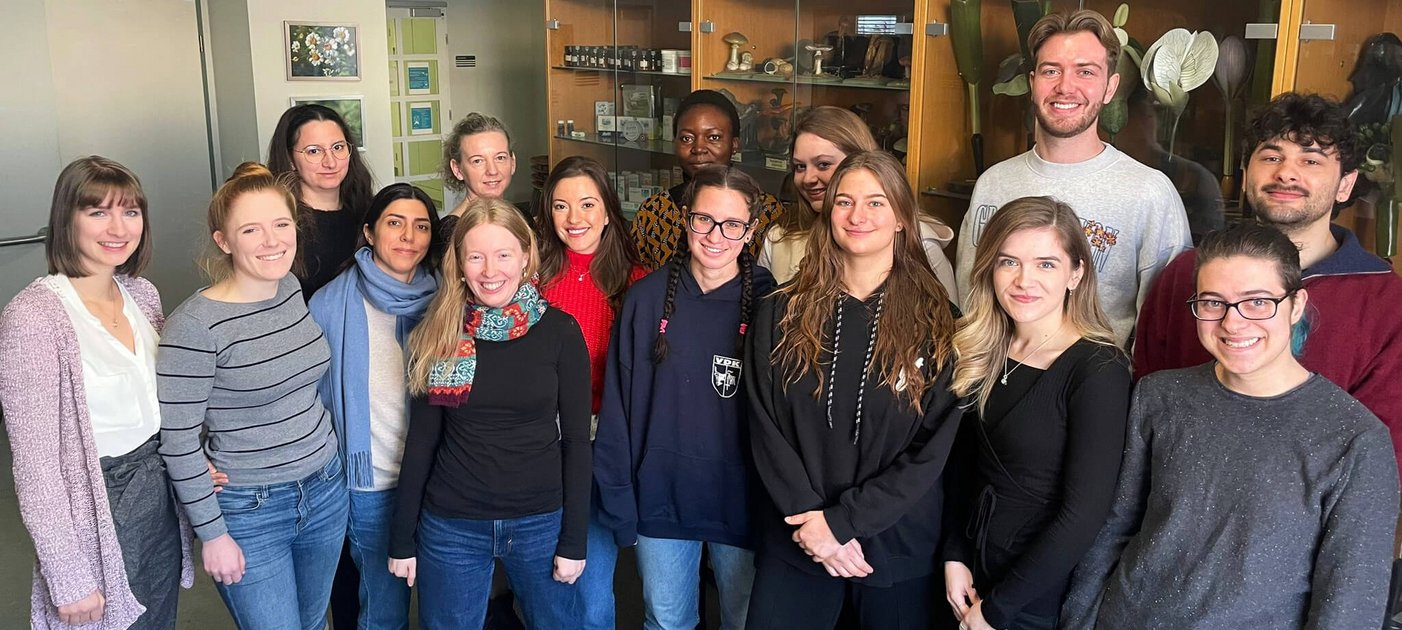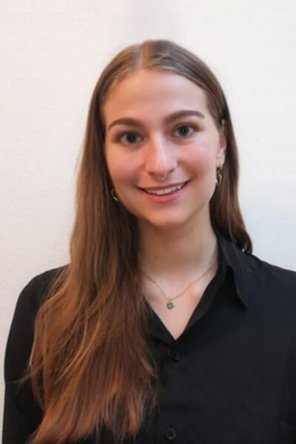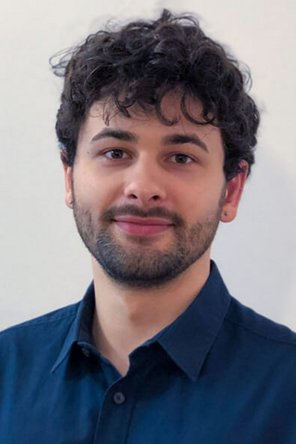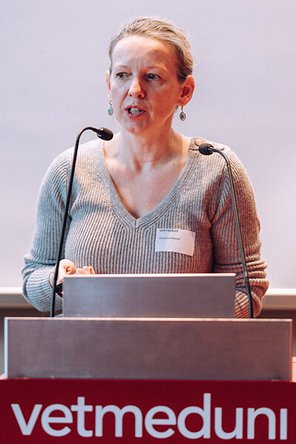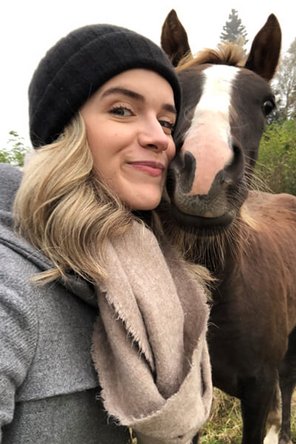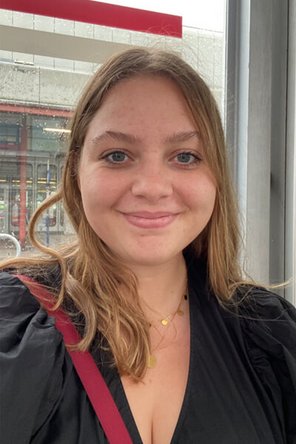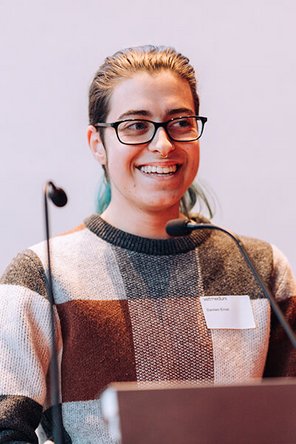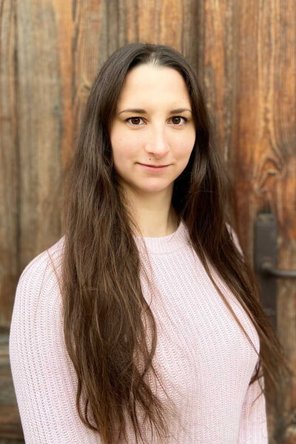- PhD One Health /
- Projects & Students
Topic: A One Health modelling approach to SARS-CoV-2
Self: Anna is a veterinarian currently associated with the Department of Veterinary Public Health and Epidemiology, and the Institute for Computational Medicine at the University of Veterinary Medicine, Vienna. Her research focus is zoonotic disease modelling in a One Health framework.
Project: Relying on a multidisciplinary cooperation between Veterinary Epidemiology and Computational Medicine, we will develop a One Health data repository for SARS-CoV-2 at human-animal-environment interfaces. First, machine learning will be used to predict the host range of SARS-CoV-2. Then, based on literature review and expert opinions, while accounting for cultural and socio-economic factors, we will rank the risk for spillover/spillback events of SARS-CoV-2 at human-animal-ecosystem interfaces, at national and international scales. Finally, our findings will be “translated” into guidelines to assist decision-making and operationalise One Health approaches to SARS-CoV-2, and more generally, to zoonotic-origins epidemics/pandemics.
Supervisors:
- Assoc. Prof. Amélie Desvars-Larrive, Clinical Department for Farm Animals and Food System Science, Centre for Food Science and Veterinary Public Health, Complexity Science Hub
- Univ. Prof. Peter Michael Roth, Computational Medicine
- Univ. Prof. Christian Walzer, Department of Interdisciplinary Life Sciences, Research Institute of Wildlife Ecology, Wildlife Conservation Society 2
Topic: Salmonella Infantis and the pESI-like plasmid, a dangerous liaison for public health
Self: Hello, I'm Richard Liermann (24) from Germany and I studied veterinary medicine in Vienna
Project: In the EU Salmonella Infantis became the most common serovar in broiler chickens. The main objective of the proposed project is to investigate the ability of Salmonella Infantis to transmit a pESI-like plasmid in vitro to selected pESI-negative Salmonella Infantis strains.
We hypothesize that an uptake of the plasmid effects thew fitness and virulence of the recipient bacteria.
Supervisors:
- Clinic for Poultry and the Institute for Microbiology
- Dr. med. vet. Claudia Hess, Dipl.ECPVS, Clinical Department for Farm Animals and Food System Science, Clinical Centre for Population Medicine in Fish, Pig and Poultry
- Priv.-Doz. Dr. med. vet. Joachim Spergser, Department of Biological Sciences and Pathobiology, Centre of Pathobiology
- Mag. med. vet. Victoria Drauch, PhD., Clinical Department for Farm Animals and Food System Science, Clinical Centre for Population Medicine in Fish, Pig and Poultry
Topic: Novel strategies for mitigating the risk posed by antibiotic resistance in Listeria monocytogenes along the food chain and at bedside
Self: I’m Pia Saria, I just finished my studies of veterinary medicine at the University of Veterinary Medicine Vienna. During this time, I specialised in food safety, food hygiene, public health, farm animals, microbiology and antimicrobial resistance
Project: I am happy to work with Univ.-Prof. Dr. med. vet. Karin Schwaiger from the Unit for Food Hygiene and Technology and Ass.-Prof. Olga Makarova, PhD from the Unit of Public Veterinary Health and Epidemiology on my PhD, in which we will be researching Listeria monocytogenes, a food pathogen, and aiming to investigate novel methods in the detection of phenotypic antimicrobial resistance in this bacteria.
Supervisors:
- Univ.-Prof. Dr. med. vet. Karin Schwaiger Clinical Department for Farm Animals and Food System Science, Centre for Food Science and Veterinary Public Health
- Ass.-Prof. Olga Makarova, PhD Clinical Department for Farm Animals and Food System Science, Centre for Food Science and Veterinary Public Health
- Priv.-Doz. Dr. Kathrin Kober-Rychli, Clinical Department for Farm Animals and Food System Science, Centre for Food Science and Veterinary Public Health
Topic: Extracellular vesicles in obesity driven cell metabolic and immune response at the lymphatic endothelium/adipocyte interface
Self: I completed my bachelor’s degree in Molecular Life Sciences in Hamburg, where I worked in the calcium signaling group led by Prof. Guse. My bachelor’s project explored the ryanodine receptor’s role in calcium-mediated activation of T cells. For my master’s degree, I moved to Vienna, where I studied Molecular Biology with a neuroscience emphasis. During my master’s project at MedUni, I investigated extracellular vesicle signaling in peripheral nerve regeneration under the guidance of Prof. Radtke.
Project: My One Health PhD project investigates how mitochondrial dysfunction impacts extracellular vesicle signaling. Specifically, I’m studying the vesicle-mediated crosstalk between adipocytes and lymphatic endothelial cells in obesity. We propose that extracellular vesicles play a central role in modulating cellular metabolism, immunity, and overall cell integrity at this interface. The inclusion of dogs in our One Health project is crucial as they are exposed to a similar lifestyle and environmental factors as humans, providing valuable insights into the mechanisms associated with obesity.
Supervisors:
- Ass. Prof. Dr. Karin Nowikovsky, Department of Biological Sciences and Pathobiology, Centre of Biological Sciences
- Ass.-Prof. Dr. Mag. Silvio Kau-Strebinger MSc., Department of Biological Sciences and Pathobiology, Centre of Pathobiology
Topic: Linking benzene exposure to exosomes
Self: I have received training in the philosophy of animate nature at the Catholic University in Lublin, (Poland), and pursued studies in comparative biomedicine at the Veterinary Medicine University in Vienna. My academic background has fostered an interest in synthesizing complex systems, acknowledging the imperative role of dissecting intricate elements within broader frameworks.
My aspiration lies in contributing to a collective effort aimed at fostering global health and ensuring environmental safety. Being an integral part of a team dedicated to these noble goals is the focal point of my forthcoming life journey
Project: In my project, I'll be leveraging the HPCLSK system to investigate how benzene, an environmental toxin, influences hematopoiesis and exosome behavior. By exploring benzene's effects on stem cell function and exosome dynamics, I aim to uncover crucial insights into pollutant-induced hematopoietic diseases. This research holds promise for identifying potential biomarkers and innovative therapeutic approaches in this field.
Supervisors:
- Karoline Kollmann, Ph.D., Department of Biological Sciences and Pathobiology, Centre of Biological Sciences
- Ralf Steinborn, Univ. Prof. Dr., VetCore
Topic: Ecophysiology of desert stopover in passerine migrants
Self: Hi, my name is Tabe Tiku Regine Claire and I am a PhD student in the One-Health Doctoral program at the University of Veterinary Medicine, Vienna, Austria
With a BSc and a double Master's degree from the University of Buea, Cameroon, and the University of Glasgow, UK respectively, I have a background in Microbiology, Ecology, and Environmental Biology.
Project: I am studying blood parasites in migratory birds in a field site in Morocco and the effects of these parasites on bird physiology and behaviour. My goal is to understand host-parasite interactions and the importance of these interactions on avian populations and humans as a whole. I am happy doing what I love and I look forward to sharing my experience.
Supervisors:
- Dr. Ivan Maggini, Department of Interdisciplinary Life Sciences, Konrad-Lorenz-Institute of Ethology
- Prof. Herbert Weissenböck, Department of Biological Sciences and Pathobiology, Centre of Pathobiology
Topic: New Theranostics Targeting Multidrug Resistance in Cancer
Self: After earning my Bachelor's and Master's degrees in Microbiology in Iran, I moved to Vienna and enrolled in a Master's program focusing on Molecular Microbiology, Microbial Ecology, and Immunobiology at the University of Vienna. I completed my master's thesis at the Medical University Vienna, exploring the field of neuroimmunology by working on a rare autoimmune disease i.e., Myasthenia Gravis. This allowed me to gain practical experience in cell and molecular biology. To broaden my theoretical and experimental skills, I took two internships at the University of Vienna and Biomin GmbH. Eager to continue my academic journey, I applied for a PhD position at the University of Veterinary Medicine Vienna.
Project: Currently, my focus lies on my PhD project titled “New Theranostics Targeting Multidrug Resistance in Cancer”. The aim is to develop an MRI-sustained salinomycin-based theranostic tool that targets the major axes of therapy resistance and malignant progression, i.e., the epithelial-mesenchymal transition (EMT), cancer stem cells, and p-glycoprotein (P-gp) in melanoma.
Supervisors:
- DI. Dr. habil. Sabine Brandt, Clinical Department for Small Animals and Horses, Clinical Centre for Equine Health and Research, Research group Oncology
- Dipl.ECVDI Dr.med.vet. Carina Strohmayer, Clinical Department for Small Animals and Horses, Clinical Centre for Diagnostic Imaging
Topic: Tackling colitis via the ERBB receptor system – a novel therapeutic target for equine and human patients
Self: I studied biology at the University of Vienna and did my master’s degree in human-animal interaction at the University of Veterinary Medicine Vienna. Here I discovered my passion for comparative medicine which is perfectly matched by the topic of my PhD.
Project: Severe cases of colitis, a digestive disease characterized by acute or chronic inflammation of the large intestine, occur in both humans and horses. Currently, the therapeutic options are scarce. ERBB receptors have been shown to influence intestinal integrity and inflammation. Therefore, we aim to investigate whether activation of the ERBB receptors, particularly EGFR and ERBB4, may have a supportive role in the therapy of colitis in one or both species.
Supervisors:
- Univ. Prof. Dr. med. vet. Maik Dahlhoff, Department of Biological Sciences and Pathobiology, Centre of Biological Sciences
- Ass. Prof. Dr. med. vet. Franziska Dengler, Department of Biological Sciences and Pathobiology, Centre of Biological Sciences
Topic: Highlighting the occurrence of pathogenic fungi in the skin of alpacas and llamas, and their importance for animal and human health
Self: Eva-Maria Bartl studied veterinary medicine at the vetmeduni and graduated in 2021. From 2022 to 2023, she worked as a research assistant in the MuD Animal Welfare Project on New World camelids under the supervision of Dr Henrik Wagner at the Veterinary Clinic for Reproduction and Neonatology, Justus Liebig University Giessen, Germany.
Project: The project aims to study the composition, diversity and function of microbes inhabiting New World camelids (NWC). Prone to dermatitis the skin of alpacas and llamas has been shown to harbor multiple fungal species, which could not only contribute to disease development and progression in them but could also have the potential to infect humans. Samples of superficial skin scrapes would be collected from healthy, as well as diseased animals with skin lesions, together with thorough clinical analysis. Both culture-dependent (culturomics) and culture-independent (targeted amplicon sequencing) methods would be used to get a coherent view of their skin’s microbiome structure and function. Relevant pathogenic fungal isolates would be sequenced and patho-typed for virulence genes. Based on the results, risk analysis could be performed to develop evidence-based biosecurity measures.
Supervisors:
- Priv.-Doz. Rohini Chopra-Dewasthaly, PhD, Department of Biological Sciences and Pathobiology, (Institute of Microbiology)
- Dr.med.vet.Cassandra Eibl, Clinical Department for Farm Animals and Food System Science, Clinical Centre for Ruminant and Camelid Medicine
Title: Antibiotics in semen extender – a possible cause for the emergence of antimicrobial resistance?
Self: My name is Anna Lauciello and I graduated in Veterinary Medicine from the University of Milan in 2022. Driven by my deep passion about equine reproduction, I am now pursuing a PhD program at VetMedUni Vienna.
Project: Stallions' distal genital tract commensal bacteria are commonly transferred to ejaculate during semen collection and further contamination may occur during semen processing. Therefore, in accordance with national and international legislation, equine semen preservation involves antibiotics-containing extenders, which exposes the female reproductive tract to non-therapeutic antimicrobial levels following artificial insemination. This practice may contribute to fertility issues and antimicrobial resistance (AMR) development. My PhD project seeks to enhance understanding of how equine artificial insemination affects the composition, diversity, and function of the microbiome in the healthy equine genital tract.
Supervisors:
- Ao. Univ.-Prof. Dr. med. vet. Christine Aurich, Clinical Department for Small Animals and Horses, Clinical Centre for Animal Reproduction
- Priv.-Doz. Dr. med. vet. Igor Loncaric, Department of Biological Sciences and Pathobiology, Centre of Pathobiology
Title: Exploration of the potential of organoids for deciphering enterotoxicity, as exemplified by the foodborne pathogen Bacillus cereus
Self: My name is Kristina Schmidhofer. I completed bachelor's degree in "Biomedicine und Biotechnologies" and my master´s degree in "Comparative Biomedicine" at the University of Veterinary Medicine Vienna.
Project: Bacillus cereus sensu lato (s.l.) represents a group of closely related Bacillus species with varying toxicity, ranging from biopesticides to strains causing human fatalities. To explore the mechanism of the B. cereus s.l. enterotoxins and establish a risk based diagnostic system, we aim to use intestinal organoids and subsequently establish an organoid-on-a-chip system for routine diagnostics.
Supervisors:
- Univ. Prof. Dr. Monika Ehling-Schulz, Department of Biological Sciences and Pathobiology, Centre of Pathobiology
- Dr. Alexandro Rodriugez Rojas, Clinical Department for Small Animals and Horses, Clinical Centre for Small Animal Health and Research
- Dr Georg Csukovich, Cluster of Excellence Physics of Life, TU, Dresden, Germany
Title: The role of pigs in Listeria monocytogenes epidemiology in the One health context
Self: studied veterinary medicine at the University for Veterinary Medicine in Vienna, graduated in 2023, specialized in food safety and food sciences, farm animals, public health.
Project: My PhD Project is focused on the detection of Listeria monocytogenes, a foodborne pathogen, in pigs and along the pork production chain. I plan to sample pigs and their farm environment as well as slaughterhouses to isolate strains of Listeria. spp. and gather information on prevalence, tissue tropism and genetic profiles. Using this data, the role of pigs in the epidemiology of Listeria monocytogenes in pigs in Austria will be assessed.
Supervisors:
- Priv.-Doz. Dr. Kathrin Kober-Rychli, Clinical Department for Farm Animals and Food System Science, Centre for Food Science and Veterinary Public Health
- Dr. med. vet. Lukas Schwarz, Clinical Department for Farm Animals and Food System Science, Clinical Centre for Population Medicine in Fish, Pig and Poultry
- Univ.-Prof. Dr. Barbara Metzler-Zebeli, Clinical Department for Farm Animals and Food System Science, Centre for Animal Nutrition and Welfare
Title: CRISPR/Cas9-mediated identification of genes that modulate drug efficiency in canine lymphoma
Self: My name is Patricia Testori and I am a PhD Student of the Vetmeduni OneHealth Phd Call. I studied molecular biotechnology during my bachelors and masters and performed my bachelor thesis under the supervision of Dagmar Gotthardt, PhD. My master thesis was supervised by Elizabeth Heyes, PhD.
Project: I work on canine DLBCL, and I am going to perform genome-wide CRISPR/Cas9 screens to identify genes that modulate the efficacy of newly approved drugs to treat canine lymphoma. My project will lead to new insights into molecular determinants of sensitivity/resistance to anticancer drugs and will shed light on reliable biomarkers to predict treatment response of canine DLBCL.
Supervisors:
- Prof. Dr. Florian Grebien, Department of Biological Sciences and Pathobiology, Centre of Biological Sciences
- Dr. med. vet. Barbara Rütgen, Labordiagnostik
- DVM Maciej Parys, PhD, University of Edinburgh
Title: One Health in Allergology: Comparing weaning conditions of cattle with beta-lactoglobulin and binding partners in milk
Project: Growing up on a farm and consuming raw cow's milk are linked to lower asthma and allergy risks, known as the "Farm effect." As cattle-specific factor, our working group revealed the immune-modulating milk protein beta-lactoglobulin (BLG). This whey protein is present in high levels in stable environment and ambient air, and its source is the urine of female and male cattle. In the present PhD project, we are going to explore whether different stress situations of cows (here, different weaning conditions) affect milk protein fractions, including beneficial proteins/ligands, and components like cortisol. Overall, the results represent the basis for future research on stress of cows and its impact on the allergy-protective effect of milk for consumers.
Supervisors:
- Dr.rer.nat. Dr.scient.med. Priv.-Doz. Isabella Pali-Schöll, Department of Interdisciplinary Life Sciences, Messerli Research Institute of Human Animal Interactions
- AO.Univ.-Prof. Dr.med.vet. Rupert Palme, Experimental Endocrinology ,University of Veterinary Medicine Vienna
